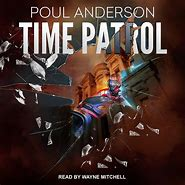Time travel fiction should recognize the ordinary passage of time. HG Wells' Time Traveller and Poul Anderson's mutant time travellers witness the passage of days, nights and seasons while time travelling whereas Time Patrol agents jump instantly from one place and time to another. However, the people visited by the agents experience time in the ordinary way:
"Winter descended and then slowly, in surges of wind, snow, icy rain, drew back." (p. 362)
Winter is lightened in the thorp by the river by the presence of Carl. He comes and goes and we know that he sometimes jumps ahead in time but that is unknown to his hosts and not mentioned in this chapter.
"Spring stole northward, snow melted, buds burst into leaf and flower, the river brawled in spate. Homebound birds filled heaven with wings and clamor. Lambs, calves, foals tottered across paddocks. Folk came forth, blinking in sudden brightness; they aired out their houses, garments, and souls. The Spring Queen drove Frija's image from farm to farm to bless the plowing and sowing, while garlanded youths and maidens danced around the oxcart. Longings quickened.
"Carl went away still, but now he would be back on the same evening. More and more were he and Jorith together." (p. 365)
Indeed. Longings quicken, including in Carl. He is becoming involved in one place and time in a way that a Time Patrol agent should not.

11 comments:
Local liaisons seem to be somewhat frowned on, but not forbidden. And in many instances, you'd be thought to be showing hostility or arrogance by the locals if you didn't engage in them.
I'd point out a technique used by French-Canadian -voyageurs-, fur-traders, in much of Canada.
They'd move in, make friends with some group of locals, and one or two would marry (often in recognized temporary unions) local girls.
Then they'd spend a winter or a year getting to really know the locals, learn the language and customs, and tap into their knowledge of local climate, animal patterns, populations, relations between groups, etc.
Then serious trading could begin.
As an amusing aside, this is why northern Canada is littered with place names like "Slave lake" or "Dog river". They'd ask their new friends who it was lived "over there".
And get replies like: "Oh, you mean the -slave- people", or "Oh, that's the -dog- tribe."
I heard that, in Africa, some rivers came to be called, e.g., "I don't know what it's called; ask the chief" River or "It's a bloody river, isn't it?" River.
There's a story -- quite possibly true -- that the river and nation of Senegal were named when a Portuguese explorer pointed and asked:
"What's that river called?"
The local, who spoke Wolof but no Portuguese, replied:
"Sunnu Gal."
Which means, in Wolof, "That's my canoe", which is what he thought the explorer was asking.
There is a town in Madagascar that actually is named: "You can tie up your boat down there," for similar reasons.
And England has lots of "River Avons", because in Brythonic Celtic (proto-Welsh), "avon" means "river".
Those sound like the myth debunked here about the origin of the name of a certain animal.
https://en.wikipedia.org/wiki/Kangaroo#Terminology
Are they better attested, or at least not disproven?
Jim: "not disproven" for Senegal, and authentic for the town in Madagascar.
I guess these stories were inspiration for what a central African character in the Nantucket series was called by some people from Tartessos. He said something like "I am a man", meaning not a ghost, & that became what he was called by them.
Jim: yup. Improvised sign language between people speaking languages utterly unknown to each other can lead to some odd results. For example, you may think you're pointing to yourself and saying your name; the person listening may think that you're pointing to your head and saying the word for "head".
Remember, if there's no commonality of language and you point to yourself and say: "My name is X", what the person listening is hearing is "X X X X".
All the words are equally unknown.
A friend of ours didn't realize that. Sheila said she would meet a Chinese moment and say, "My name is Sheila," and that the Chinese woman would respond, "My name is Sheila." Our friend said, "Surely she knows her own name?"
I should have asked him, "Cad is ainm duit?" I would then have elucidated, "Pol is ainm dom," pointing at myself, "Cad is ainm duit?," pointing at him. He still wouldn't have got it.
The word, "moment," got in there somehow.
Post a Comment